India’s consumer economy has roared to life with its strongest Navratri sales in more than a decade, propelled by the Modi government’s NextGen GST reforms that slashed tax rates on 375 items, effective September 22, 2025. Government officials and industry executives report growth ranging from 25% to 100% across automobiles, electronics, and lifestyle products, turning the nine-day festival into a consumption bonanza that signals robust festive momentum heading into Diwali. For shoppers, retailers, and economists searching Navratri sales 10-year high GST cuts, festive consumption surge 2025, or Maruti Suzuki Navratri records, this surge—driven by lower prices on aspirational goods like cars and large-screen TVs—has boosted sentiment, with Maruti Suzuki doubling deliveries to 1.65 lakh vehicles in eight days and Haier exhausting Diwali inventory of 85-inch models. As Reliance Retail logged 20-25% gains and LG reported “exponential growth,” the GST tweaks—consolidating slabs to 5%, 18%, 0%, and 40%—have unlocked confident spending, potentially adding Rs 50,000-75,000 crore to Q3 GDP through discretionary buys.
The rationalization eased tax burdens on essentials and luxuries, fostering a “revitalized consumption economy” amid controlled inflation.
The GST Bonanza: Slabs Rationalized for Festive Cheer
The Finance Ministry’s September 3, 2025, announcement streamlined GST into four slabs—0%, 5%, 18%, and 40%—reducing rates on 375 items, including coated paper (18% to 5%), large-screen TVs, and auto accessories. Effective September 22 (Navratri eve), the cuts lowered prices by 10-20%, spurring immediate demand.
Key changes:
- Autos: EVs and hybrids saw 5% slabs, boosting affordability.
- Electronics: TVs over 32 inches dropped to 18% from 28%, fueling upgrades.
- Lifestyle: Fashion and appliances gained from simplified rates.
Officials credit this for “turning festive cheer into record-breaking consumption,” with families splurging on vehicles and white goods.
| Slab | Key Items | Pre-Cut Rate | New Rate | Impact |
|---|---|---|---|---|
| 0% | Essentials (e.g., Textbooks) | 5-12% | 0% | Boosted Accessibility |
| 5% | Coated Paper, Packaging | 12-18% | 5% | 10-15% Price Drop |
| 18% | Large TVs, Autos | 28% | 18% | 25-100% Sales Surge |
| 40% | Luxuries | 28% | 40% | Minimal Festive Effect |
Sector Spotlights: Autos and Electronics Lead the Charge
Automobile Surge: Maruti Doubles Deliveries
The auto sector posted its best Navratri in 35 years, with Maruti Suzuki delivering 1.65 lakh vehicles in eight days—double last year’s figures. Day 1 saw a record 30,000 cars, led by SUVs like Brezza and Fronx.
- Mahindra: 60% YoY growth in XUV700 and Scorpio N.
- Hyundai: SUVs at 72% of sales, driven by Creta.
- Two-Wheelers: Hero MotoCorp doubled footfall in commuters.
Electronics Boom: Haier Sells Out Diwali Stock
Consumer electronics reported 85% growth, with Haier exhausting Diwali inventory of 85-100 inch TVs (Rs 2.5 lakh+). LG and Godrej logged “exponential” gains, while Reliance Retail rose 20-25% in large-screens and smartphones.
- Vijay Sales: Over 20% uptick.
- Trend: Premium TVs and gadgets dominated, with 65-inch models selling 300-350 units daily.
Economic Ripple: Rs 50,000-75,000 Cr Boost to Q3 GDP
The sales surge—40-45% of total festive revenue—could inject Rs 50,000-75,000 crore into Q3 GDP, per estimates. With inflation steady and sentiment high, it’s a consumption-led recovery signal.
Diwali Outlook: Sustained Momentum Expected
Executives forecast Diwali sales 20-30% above last year, with autos and electronics continuing the trend. Reliance Retail’s 20-25% Navratri gain sets a positive tone.
Conclusion: GST’s Festive Fireworks
India’s 10-year high Navratri sales on GST cuts are a consumption triumph, with autos and electronics soaring 25-100%. As Diwali nears, the momentum promises economic cheer. For retailers, it’s a boon—will the surge sustain? The garbas groove on. ET



